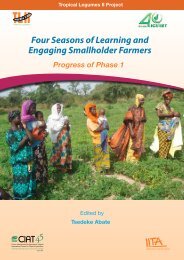Four Seasons of Learning and Engaging Smallholder Farmers - icrisat
Four Seasons of Learning and Engaging Smallholder Farmers - icrisat
Four Seasons of Learning and Engaging Smallholder Farmers - icrisat
You also want an ePaper? Increase the reach of your titles
YUMPU automatically turns print PDFs into web optimized ePapers that Google loves.
Number <strong>of</strong> NARS scientists trained<br />
Three staff in Malawi <strong>and</strong> one staff in Nigeria (all men) were trained how to emasculate <strong>and</strong> pollinate<br />
soybean<br />
Number <strong>of</strong> extension staff trained<br />
From 2007 to 2010 a total <strong>of</strong> 167 extension staff (including development agents <strong>and</strong> NGO workers)<br />
across the project countries were trained on soybean production, PVS, marketing, processing <strong>and</strong><br />
utilization. Of these, 32 were women (Table 11-28).<br />
Table 11-28: Extension staff training on soybean production, PVS, marketing, processing <strong>and</strong> utilization in five<br />
countries (2007/08 – 2009/10)<br />
Country 2007/08 2008/09 2009/10 Total<br />
Women Men Women Men Women Men Women Men<br />
Malawi 12 3 12 14 3 38<br />
Mozambique 17 44 12 23 29 67<br />
Nigeria 30 0 30<br />
Kenya 0 0<br />
Tanzania 0 0<br />
Total 17 56 3 12 12 67 32 135<br />
Gr<strong>and</strong> total: 167<br />
Workshop on Rhizobium inoculum<br />
The Soybean Rhizobium Inoculum Workshop was held on 17-21 March 2008, at Impala Hotel, Arusha,<br />
Tanzania. The main output <strong>of</strong> the workshop was the production <strong>of</strong> a document entitled ‘Investment<br />
Options for Adoption <strong>of</strong> Biological Nitrogen Fixation (BNF) in Soybean in Sub-Saharan Africa’. This<br />
document has been submitted to B&MGF. This document led to the development <strong>of</strong> a bigger project<br />
that included several legumes under the title “Putting Nitrogen Fixation to Work for Smallhoder <strong>Farmers</strong><br />
in Africa (N2Africa)”, which has started to be implemented since 2009.<br />
Vision for Phase 2<br />
Our vision for the second phase in relation to objective 7 is to increase soybean production by 15%<br />
through increasing on-farm yields by 20% on 60% <strong>of</strong> the project target area. With respect to developing<br />
improved soybean lines, we aim to evaluate 15 new lines for their drought tolerance <strong>and</strong> biological<br />
nitrogen fixation, evaluate best Rhizobium strains in at least 20 best lines, evaluate at least 10 rust<br />
resistant lines multilocation <strong>and</strong> on-farm PVS; select new breeding lines for drought <strong>and</strong> rust tolerance<br />
from more than 30 segregating populations <strong>and</strong> establish homozygous lines for multilocation testing.<br />
We also have the vision to release at least two varieties <strong>and</strong> produce 10-30 kg breeder’s seed every<br />
year from each variety developed so far. In order to speed up our work, we will exchange soybean<br />
germpalsm <strong>and</strong> inoculants with N2Africa project. Because much <strong>of</strong> the soybean produced by farmers<br />
is for market, we will assess the protein <strong>and</strong> oil quality <strong>of</strong> existing <strong>and</strong> newly developed varieties <strong>and</strong><br />
lines. In terms <strong>of</strong> capacity building, we envision to train at least 15,000 farmers in soybean processing<br />
<strong>and</strong> utilization, <strong>and</strong> establish at least four more soybean resource centers. We also aim to train five<br />
postgraduate students at MSc level in plant breeding <strong>and</strong> 1,000 farmers, extension staff <strong>and</strong> technicians<br />
in soybean production, PVS <strong>and</strong> soybean rust.<br />
Progress <strong>of</strong> Phase 1<br />
241

















